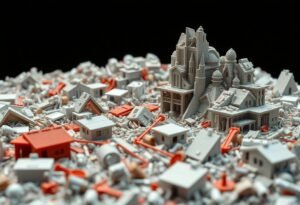The future of Non-Fungible Tokens (NFTs) is a rapidly evolving aspect of digital innovation that has captured the attention of creators, investors, and tech enthusiasts alike. As unique digital assets continue to make waves across various industries, understanding the trends and predictions surrounding NFTs is crucial for anyone invested in the future of technology, creativity, and the economy.
Unpacking the NFT Phenomenon
Non-Fungible Tokens have revolutionized the way we perceive ownership and value in the digital realm. Unlike cryptocurrencies such as Bitcoin or Ethereum, which are fungible and can be exchanged on a one-to-one basis, NFTs represent unique items or pieces of content, whether it’s art, music, virtual real estate, or collectibles. This unique ownership aspect is why NFTs are so significant in the current innovation landscape. They allow creators to monetize their work directly and enable collectors to own a genuine piece of digital property that cannot be replicated.
Key Advantages of NFTs
The benefits of NFTs extend far beyond just ownership of digital art. Here are some key points that illustrate their importance:
- True Ownership: NFTs provide verifiable proof of ownership and authenticity through blockchain technology, which is tamper-proof.
- Creator Revenue: Artists and creators can earn royalties through smart contracts every time their NFT is resold, ensuring they benefit from the ongoing value of their work.
- Community Building: NFTs often foster tight-knit communities around specific projects or collections, enhancing customer loyalty and engagement.
- Diverse Applications: Beyond art, NFTs are being used in gaming, virtual reality, fashion, and music, showcasing versatility in various sectors.
Current Trends Shaping the NFT Landscape
The NFT space has seen significant developments in recent years that can shape its future trajectory:
- Integration with Metaverse: As more platforms shift towards the metaverse, NFTs are becoming essential for virtual identity and property ownership.
- Interoperability: The demand for NFTs to be used across different platforms is growing, leading to innovative solutions for cross-chain functionality.
- Environmental Concerns: The eco-impact of blockchain technology is prompting creators and platforms to pursue more sustainable practices.
Challenges and Solutions in the NFT Space
Despite the incredible potential, the NFT industry faces hurdles that must be addressed for widespread adoption:
- Market Volatility: NFTs can experience significant price fluctuations. To mitigate this, increased education around the valuation process and long-term investment strategies is essential.
- Copyright Issues: The misrepresentation of ownership can lead to legal disputes. Clearer guidelines and protections for creators should be established to safeguard their intellectual property.
- Scalability Problems: Current blockchain networks can experience congestion. Exploration of layer-2 scaling solutions can help enhance transaction speeds and reduce costs.
Practical Tips for Navigating the NFT World
If you’re interested in diving into the world of NFTs, consider these essential tips:
- Do Your Research: Understand the market, trends, and platforms before purchasing or creating NFTs.
- Engage with the Community: Networking with other NFT enthusiasts can provide valuable insights and opportunities.
- Start Small: If you’re a creator, consider starting with smaller projects to gauge interest and understand the mechanics of NFT markets.
Case Study: Art Blocks and Generative Art
Art Blocks, a platform for generative art NFTs, exemplifies innovative use of NFTs to foster a new artistic movement. Artists create algorithms that generate unique pieces of art, which collectors purchase in real-time. This model not only democratizes art creation but also encourages collaboration and creativity among artists, showcasing the **community-centric** nature of NFTs.
Legal Considerations in the NFT Space
Several legal aspects are pertinent for NFT creators and buyers:
- Intellectual Property Rights: Ensure you understand the rights associated with the NFTs you purchase and create.
- Securities Law: In certain jurisdictions, NFTs may be classified as securities, attracting regulatory scrutiny.
- Tax Implications: Be aware of the tax responsibilities associated with buying, selling, and trading NFTs.
Common NFT Questions Answered
As curiosity about NFTs grows, here are some frequently asked questions:
- How to create an NFT? You can create NFTs through various platforms like OpenSea, Rarible, or Mintable, which guide you through the process.
- What should I consider before buying an NFT? Research the creator, understand the value proposition, and assess the potential for future income.
- Are NFTs a good investment? Like all investments, NFTs carry risks but can be lucrative if strategically approached.
Conclusion: Embracing the Future of NFTs
The future of NFTs is dynamic and vast, paving the way for innovative applications in the digital age. As trends continue to evolve and new solutions emerge, stakeholders across industries must adapt and innovate to leverage this unique technology effectively. Whether you’re an artist, investor, or tech enthusiast, the world of NFTs presents exciting opportunities to explore.
Disclaimer
This article is for informational purposes only and does not constitute professional advice on innovation. The information provided in this post should not be considered as a substitute for consultation with qualified professionals. Always seek the advice of licensed professionals.


















